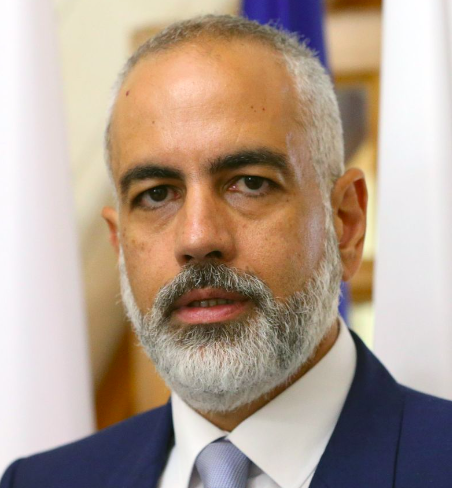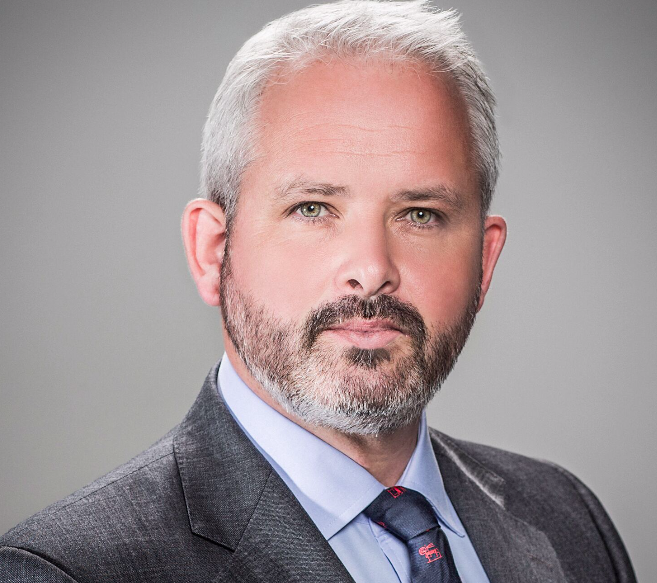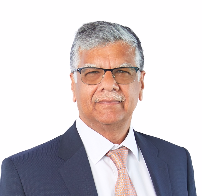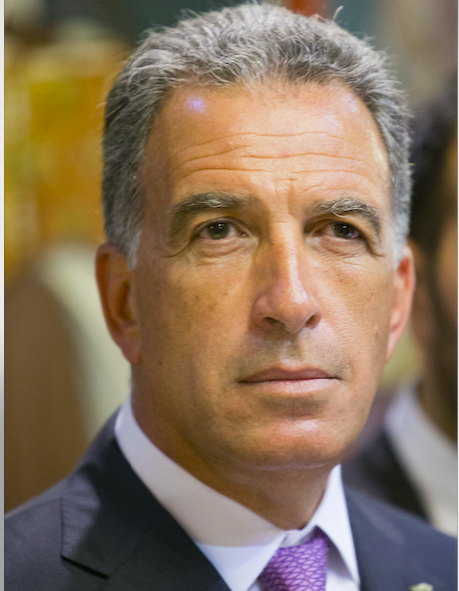On the occasion of this year’s Day of the Seafarer on June 25th, our special column is dedicated to all seafarers who currently face unprecedented challenges due to the pandemic. Industry stakeholders appreciate their efforts and they have been in talks for improving their lives onboard. In that regard, we have asked many experts to provide feedback on the following question:
In light of the COVID-19 impact on seafaring, what the most important for you for improving crew welfare?
Dr. Walther Boon, Managing Director, MedAssist.online
 In daring times, like this pandemic, I feel we need to make sure we Leave No One Behind. Physically and emotionally. Make sure every seafarer knows and feels that we need him or her. That we care about them and the work they do. And make sure they know we will provide them with the best medical care possible if they need it. Use modern technology to reach out and keep in touch with all of them and to provide them with best care possible. The seafarers and their work are essential to our world. Their wellbeing should be essential to us. We should make sure each and every one of them makes it back home – safely.
In daring times, like this pandemic, I feel we need to make sure we Leave No One Behind. Physically and emotionally. Make sure every seafarer knows and feels that we need him or her. That we care about them and the work they do. And make sure they know we will provide them with the best medical care possible if they need it. Use modern technology to reach out and keep in touch with all of them and to provide them with best care possible. The seafarers and their work are essential to our world. Their wellbeing should be essential to us. We should make sure each and every one of them makes it back home – safely.
Stamatis Bourboulis, General Manager, Euronav Ship Management (Hellas) Ltd
 The COVID 19 situation was a particular challenge for the crew mainly due to the long delays and uncertainty related to embarking and disembarking possibilities. The international community should recognize the seafarer’s role as a vital factor in the global supply chain and the governments should agree on protocols that would warrant the seafarers’ travel to and from the ships in such cases. The role of shipping associations in communicating and organizing such an understanding and regulatory framework is quite important. In addition, the ability of crew for effective communication with their families and friends is quite crucial and companies should seriously work on that where needed.
The COVID 19 situation was a particular challenge for the crew mainly due to the long delays and uncertainty related to embarking and disembarking possibilities. The international community should recognize the seafarer’s role as a vital factor in the global supply chain and the governments should agree on protocols that would warrant the seafarers’ travel to and from the ships in such cases. The role of shipping associations in communicating and organizing such an understanding and regulatory framework is quite important. In addition, the ability of crew for effective communication with their families and friends is quite crucial and companies should seriously work on that where needed.
Elisabeth Calbari, Neuropsychologist, Neuroleadership Trainer, Founder, Self Balance
 Resilience proved to be the factor that helped shipping companies survive during the pan-demic, but more needs to be accomplished. Although officers and crew made every effort to adapt swiftly to the challenges faced, it has become evident that a more pro-active ap-proach is required. Building a resilient fundament translates into crew members with lead-ership skills, who know how to strike a balance between their own needs and those of their fellow crew members and who understand team dynamics as well as the challenges faced by shore personnel and business owners alike. Being resilient means taking a more holis-tic approach into one’s profession. In the end, resilience and leadership taken together are a mindset; a set of emotions which can be learned and improved with practice. And they are critical towards the sustainability of any busines
Resilience proved to be the factor that helped shipping companies survive during the pan-demic, but more needs to be accomplished. Although officers and crew made every effort to adapt swiftly to the challenges faced, it has become evident that a more pro-active ap-proach is required. Building a resilient fundament translates into crew members with lead-ership skills, who know how to strike a balance between their own needs and those of their fellow crew members and who understand team dynamics as well as the challenges faced by shore personnel and business owners alike. Being resilient means taking a more holis-tic approach into one’s profession. In the end, resilience and leadership taken together are a mindset; a set of emotions which can be learned and improved with practice. And they are critical towards the sustainability of any busines
Andy Cook, Global Crew Operations Director, V.Ships
 When the Covid-19 pandemic started to impact upon the shipping industry in March 2020, all private and government stakeholders within the industry had no previous experience as to how to manage the challenges. This resulted in all stakeholders protecting their own businesses without evaluating the knock-on effect for the industry. The vast majority of vessels continued to trade but the net result of this is that the seafarers bore the brunt of the pandemic and this continues to have major implications for their welfare. Now that we have the experience gained over the past 16 months, there is now an opportunity for government agencies, industry federations and maritime regulatory bodies to consult on how to focus on the seafarer, assign them as ‘key transport workers’ and protect the maritime industry.
When the Covid-19 pandemic started to impact upon the shipping industry in March 2020, all private and government stakeholders within the industry had no previous experience as to how to manage the challenges. This resulted in all stakeholders protecting their own businesses without evaluating the knock-on effect for the industry. The vast majority of vessels continued to trade but the net result of this is that the seafarers bore the brunt of the pandemic and this continues to have major implications for their welfare. Now that we have the experience gained over the past 16 months, there is now an opportunity for government agencies, industry federations and maritime regulatory bodies to consult on how to focus on the seafarer, assign them as ‘key transport workers’ and protect the maritime industry.
Vassilios Demetriades, Cyprus Shipping Deputy Minister
 The key issue for seafarers is the crew change crisis as it not only impacts seafarers financially, but also mentally with little to no contact with others, let alone loved ones at home. With minimal Wi-Fi on board in lots of cases, the mental health of seafarers is being significantly impacted. In addition, and despite the pandemic, safety remains the top priority for Cyprus.. Ensuring seafarers are working in a safe environment is essential, and providing inspections where possible will support ship owners and operators in maintaining the productivity of their vessel both today and on a long-term basis. In general, we are urging operators to arrange surveys, audits and inspections of their vessels as early as possible while considering the circumstances within each specific location. If we can keep the personnel of those involved safe at all times, we are encouraging inspections to go ahead to meet relevant international regulations and conventions. It is essential that ship owners and operators are doing all they can to ensure seafarers have a safe and secure workplace – even amidst one of the most challenging times for not only our industry, but the world at large.
The key issue for seafarers is the crew change crisis as it not only impacts seafarers financially, but also mentally with little to no contact with others, let alone loved ones at home. With minimal Wi-Fi on board in lots of cases, the mental health of seafarers is being significantly impacted. In addition, and despite the pandemic, safety remains the top priority for Cyprus.. Ensuring seafarers are working in a safe environment is essential, and providing inspections where possible will support ship owners and operators in maintaining the productivity of their vessel both today and on a long-term basis. In general, we are urging operators to arrange surveys, audits and inspections of their vessels as early as possible while considering the circumstances within each specific location. If we can keep the personnel of those involved safe at all times, we are encouraging inspections to go ahead to meet relevant international regulations and conventions. It is essential that ship owners and operators are doing all they can to ensure seafarers have a safe and secure workplace – even amidst one of the most challenging times for not only our industry, but the world at large.
Mark Dickinson, General Secretary, Nautilus International
 The crew change crisis has both exposed and exacerbated issues around seafarer fatigue. The working practices long accepted by the industry of seafarers working 91 or 98 hours a week are completely unsustainable. A recent report by the World Maritime University also found widespread malpractices in the recording of work and rest hours with a culture of adjustment – both on and off ship – normalising fatigue among seafarers. If unaddressed, seafarer fatigue represents a ticking time bomb that could lead to serious casualties, loss of life and environmental damage. It also has a serious impact on the wellbeing and mental health of individual seafarers. As we look to retain trained seafarers and attract the workers of the future, we need to create a race to the top in international regulations – that needs to start with tackling fatigue.
The crew change crisis has both exposed and exacerbated issues around seafarer fatigue. The working practices long accepted by the industry of seafarers working 91 or 98 hours a week are completely unsustainable. A recent report by the World Maritime University also found widespread malpractices in the recording of work and rest hours with a culture of adjustment – both on and off ship – normalising fatigue among seafarers. If unaddressed, seafarer fatigue represents a ticking time bomb that could lead to serious casualties, loss of life and environmental damage. It also has a serious impact on the wellbeing and mental health of individual seafarers. As we look to retain trained seafarers and attract the workers of the future, we need to create a race to the top in international regulations – that needs to start with tackling fatigue.
Martin Dorsman, Secretary General, ECSA
 The commitment of seafarers to keep global trade going, for many of them involving personal sacrifices, can’t be appreciated enough. The best we can and should do is to make sure seafarers receive their vaccinations as quickly as possible. This is our debt of honor to them. On the longer run the current high level of attention and concrete actions for the seafarers’ welfare should be maintained. The European Community Shipowners’ Associations ECSA is committed to this and together with our social partner ETF we will continue our ongoing work on this crucial topic. Shipping is a people’s business, physical and mental wellbeing are a key priority for everybody.
The commitment of seafarers to keep global trade going, for many of them involving personal sacrifices, can’t be appreciated enough. The best we can and should do is to make sure seafarers receive their vaccinations as quickly as possible. This is our debt of honor to them. On the longer run the current high level of attention and concrete actions for the seafarers’ welfare should be maintained. The European Community Shipowners’ Associations ECSA is committed to this and together with our social partner ETF we will continue our ongoing work on this crucial topic. Shipping is a people’s business, physical and mental wellbeing are a key priority for everybody.
David Hammond Esq. CEO, Human Rights at Sea
 Crew welfare assurance in the medium-long term requires a deliberate and lasting commitment to putting the seafarer first at every stage of their employment. This includes a constant focus on their human, labour, and social rights under established international legal protections, as well as commercial management support from the point of recruitment to at-sea oversight and the ability to sign-off in a safe and timely manner. Crew are both the critical vulnerability and the most significant enabler for any maritime business entity, and they must be treated as such. Access to independent, confidential, and assured grievance mechanisms and legal support should be a ‘must’ and be embedded in all employment contracts, as well as being reflected in employer’s policies and actions in line with maritime convention provisions. While the COVID-19 pandemic has pushed the welfare of seafarers to the front of the narrative for the shipping industry, moving forwards, the profile and attention to care onboard and ashore cannot be allowed to slide backwards in business considerations. As such, the core principle that ‘human rights apply at sea, as they do on land’ must become embedded in every aspect of day-to-day business activity.
Crew welfare assurance in the medium-long term requires a deliberate and lasting commitment to putting the seafarer first at every stage of their employment. This includes a constant focus on their human, labour, and social rights under established international legal protections, as well as commercial management support from the point of recruitment to at-sea oversight and the ability to sign-off in a safe and timely manner. Crew are both the critical vulnerability and the most significant enabler for any maritime business entity, and they must be treated as such. Access to independent, confidential, and assured grievance mechanisms and legal support should be a ‘must’ and be embedded in all employment contracts, as well as being reflected in employer’s policies and actions in line with maritime convention provisions. While the COVID-19 pandemic has pushed the welfare of seafarers to the front of the narrative for the shipping industry, moving forwards, the profile and attention to care onboard and ashore cannot be allowed to slide backwards in business considerations. As such, the core principle that ‘human rights apply at sea, as they do on land’ must become embedded in every aspect of day-to-day business activity.
Christian Ioannou, Managing Director, MCTC
 If I could improve one thing onboard, it would be to make healthy nutritious food accessible to all crew. Covid-19 has raised many issues for seafarers, one of them being health and wellbeing. Food onboard vessels matters because vitamins and minerals are vital to maintaining a strong and healthy immune system. Aside from physical healthy, your mental health also benefits from a balanced diet as it provides the body with the right nutrients to function properly. A poor diet leaves your body at risk of infection, illness and disease. To help combat covid-19, governments have also issued warnings on the importance of good nutrition. Let’s improve nutrition onboard to really help our seafarers lead healthier, longer and happier lives.
If I could improve one thing onboard, it would be to make healthy nutritious food accessible to all crew. Covid-19 has raised many issues for seafarers, one of them being health and wellbeing. Food onboard vessels matters because vitamins and minerals are vital to maintaining a strong and healthy immune system. Aside from physical healthy, your mental health also benefits from a balanced diet as it provides the body with the right nutrients to function properly. A poor diet leaves your body at risk of infection, illness and disease. To help combat covid-19, governments have also issued warnings on the importance of good nutrition. Let’s improve nutrition onboard to really help our seafarers lead healthier, longer and happier lives.
Capt. Dimitris Kalosakas, Group Training Director/Senior Instructor, Elvictor Group (Cyprus)
 In light of the COVID-19, and speaking as ex-seafarer, the most important for seafarers improving their welfare is their positive thinking. It is the ultimate form of realism because it’s the belief that they have the power to change their reality and alter their future. They aren’t victims of circumstances, and there are good things ahead of them. So, the best is going to happen, not the worst. Every situation that we encounter in life is open to our interpretations. A seafarer with a positive attitude tends to interpret any condition as good than bad, not because it is objectively one or the other, but because he recognizes that it’s within his power to choose and make him feels better. Thus, if they want to live longer, be happy, healthy, and prosperous seafarers, all they have to do is thinking positively. Happy seafarers’ day!
In light of the COVID-19, and speaking as ex-seafarer, the most important for seafarers improving their welfare is their positive thinking. It is the ultimate form of realism because it’s the belief that they have the power to change their reality and alter their future. They aren’t victims of circumstances, and there are good things ahead of them. So, the best is going to happen, not the worst. Every situation that we encounter in life is open to our interpretations. A seafarer with a positive attitude tends to interpret any condition as good than bad, not because it is objectively one or the other, but because he recognizes that it’s within his power to choose and make him feels better. Thus, if they want to live longer, be happy, healthy, and prosperous seafarers, all they have to do is thinking positively. Happy seafarers’ day!
Sunil Kapoor, Director, FML Ship Management, Cyprus
 This effect of Pandemic has caused severe crisis in shipping and more so on the seafarers. This acute crisis on the wellbeing of the seafarers will be felt for many years to come. Mental health and wellbeing is the major cause of concern today. So many seafarers are facing anxiety, hopelessness and are at unease. This uncertainty on the ship is causing depression and psychotic breakdown. During this challenging time our focus and target is to provide support on their wellness and their mental wellbeing. We do want to pass on a strong message that our seafarers are not alone and full support is provided while on board and ashore. Here at Fleet we call it a 360 Degree support system. We provide support when joining, while on board and after disembarkation from the vessel. Vaccination, insurance, monetary relief, availability of a doctor 24/7 and welfare calls are part of our support system.
This effect of Pandemic has caused severe crisis in shipping and more so on the seafarers. This acute crisis on the wellbeing of the seafarers will be felt for many years to come. Mental health and wellbeing is the major cause of concern today. So many seafarers are facing anxiety, hopelessness and are at unease. This uncertainty on the ship is causing depression and psychotic breakdown. During this challenging time our focus and target is to provide support on their wellness and their mental wellbeing. We do want to pass on a strong message that our seafarers are not alone and full support is provided while on board and ashore. Here at Fleet we call it a 360 Degree support system. We provide support when joining, while on board and after disembarkation from the vessel. Vaccination, insurance, monetary relief, availability of a doctor 24/7 and welfare calls are part of our support system.
Panagiotis Kourkoumelis, Training and Development Manager, Kyklades Maritime Corporation
 Our priority, from the very beginning, has been to ensure that our colleagues onboard don’t feel neglected and detached. The most important aspect to maintain, and improve, crew welfare is onboard social interaction. In this respect, apart from supply of equipment that might assist in bringing the people together onboard, we are now forming a working group to discuss the arrangements and facilities of our next newbuilding. Our aim is to assist our seafarer to ‘engage’ in group activities and ‘disengage’ from work
Our priority, from the very beginning, has been to ensure that our colleagues onboard don’t feel neglected and detached. The most important aspect to maintain, and improve, crew welfare is onboard social interaction. In this respect, apart from supply of equipment that might assist in bringing the people together onboard, we are now forming a working group to discuss the arrangements and facilities of our next newbuilding. Our aim is to assist our seafarer to ‘engage’ in group activities and ‘disengage’ from work
Johanna Kull, Loss Prevention Executive, ALANDIA
 First, shipping companies need to take responsibility to enable the crews to take care of their basic needs, sleep, hygiene, healthy food, safety and security, as well as social support onboard. We also need to keep working on erasing the stigma on mental health struggles and spread knowledge about it to decrease the prejudices. I think these are important subjects, but I would encourage everybody with crew responsibility, to ask questions. What is important for you and what is not working as expected? What do you need to feel good about your work and yourself? If you listen to the answers, you are on the right track to make a real improvement in crew welfare.
First, shipping companies need to take responsibility to enable the crews to take care of their basic needs, sleep, hygiene, healthy food, safety and security, as well as social support onboard. We also need to keep working on erasing the stigma on mental health struggles and spread knowledge about it to decrease the prejudices. I think these are important subjects, but I would encourage everybody with crew responsibility, to ask questions. What is important for you and what is not working as expected? What do you need to feel good about your work and yourself? If you listen to the answers, you are on the right track to make a real improvement in crew welfare.
Capt. Vishal Kumar, Nautical Manager, INTERTANKO
 The outbreak of COVID-19 has had a devastating impact on the world, sparing no country. This has hugely impacted the maritime industry and thus the seafarer’s life. Global shipping depends on nearly 2 million seafarers world-wide, who makes it possible for the world to receive the goods and products needed for everyday life. Maritime Industry bodies, NGO, IMO are working hard by issuing many guidance and circulars, but Seafarers are still struggling to get recognition as key worker status in many countries. The serious challenges seafarers have faced so far are relating to quarantine requirements restriction on the border crossings, repatriation & crew changeovers, abandonment, renewal of certification and licensing of seafarers. Seafarers are forced to serve beyond normal contract periods. They are stuck onboard for extended periods. It seems that there are spikes in infections or new variants identified and the route to home for seafarers is denied. Government needs to understand the transient nature of seafarer’s profile and their importance for the global trade. Any decision on further restricting seafarers travel to the crew change hub ports should be taken pragmatically. Issues of when and how seafarers will be vaccinated is also important. Prioritizing seafarers in their home country for vaccination will be of great help. Also, countries who have single dose WHO listed vaccine available should offer and prioritize for international seafarers. It is not all negative. There is progress being made but slowly.
The outbreak of COVID-19 has had a devastating impact on the world, sparing no country. This has hugely impacted the maritime industry and thus the seafarer’s life. Global shipping depends on nearly 2 million seafarers world-wide, who makes it possible for the world to receive the goods and products needed for everyday life. Maritime Industry bodies, NGO, IMO are working hard by issuing many guidance and circulars, but Seafarers are still struggling to get recognition as key worker status in many countries. The serious challenges seafarers have faced so far are relating to quarantine requirements restriction on the border crossings, repatriation & crew changeovers, abandonment, renewal of certification and licensing of seafarers. Seafarers are forced to serve beyond normal contract periods. They are stuck onboard for extended periods. It seems that there are spikes in infections or new variants identified and the route to home for seafarers is denied. Government needs to understand the transient nature of seafarer’s profile and their importance for the global trade. Any decision on further restricting seafarers travel to the crew change hub ports should be taken pragmatically. Issues of when and how seafarers will be vaccinated is also important. Prioritizing seafarers in their home country for vaccination will be of great help. Also, countries who have single dose WHO listed vaccine available should offer and prioritize for international seafarers. It is not all negative. There is progress being made but slowly.
Nikos D. Marmatsouris, F.I.C.S., Group Senior Marketing Manager / GAC Shipping SA
 I strongly believe we should all work to promote public awareness for the current crew change crisis – which I find similar to being a “crime against humanity”. Keeping maritime workers stranded onboard for such long periods, well past their normal working contract which causes high stress and may lead to maritime safety situations due to human fatigue and mental wellness issues. Governments of all countries must understand the problem and make provisions to permit crew changes – always following international safety standards. There is no other way forward to end this crisis.
I strongly believe we should all work to promote public awareness for the current crew change crisis – which I find similar to being a “crime against humanity”. Keeping maritime workers stranded onboard for such long periods, well past their normal working contract which causes high stress and may lead to maritime safety situations due to human fatigue and mental wellness issues. Governments of all countries must understand the problem and make provisions to permit crew changes – always following international safety standards. There is no other way forward to end this crisis.
Maria Mavroudi, Founder, Searock Marine Insurance Brokers
 Seafarers continue to be at the forefront of the battle against covid-19 ensuring that the world trade flow operates uninterrupted, at tremendous personal sacrifice. The travel restrictions have forced hundreds of thousands of seafarers to stay on ships way beyond the expiry of their initial contracts which could lead to extreme pressure, crew fatigue and increased risk of maritime incidents. It is important to remember Shipping is a global industry, and has to be treated as such. It is very difficult and inefficient to deal with different rules, even irrational procedures and implications in different parts of the world which mainly arise from the lack of knowledge of local governments. As soon as we start treating seafarers as the key workers for the global economy, and treat them with the respect they deserve then a big step towards improving crew welfare would be taken.
Seafarers continue to be at the forefront of the battle against covid-19 ensuring that the world trade flow operates uninterrupted, at tremendous personal sacrifice. The travel restrictions have forced hundreds of thousands of seafarers to stay on ships way beyond the expiry of their initial contracts which could lead to extreme pressure, crew fatigue and increased risk of maritime incidents. It is important to remember Shipping is a global industry, and has to be treated as such. It is very difficult and inefficient to deal with different rules, even irrational procedures and implications in different parts of the world which mainly arise from the lack of knowledge of local governments. As soon as we start treating seafarers as the key workers for the global economy, and treat them with the respect they deserve then a big step towards improving crew welfare would be taken.
Ross Millar, Loss Prevention Associate, Steamship Insurance Management Services Limited
 Mental well-being support! Over the past 18 months COVID has presented numerous challenges that risk leaving many seafarers feeling anxious, vulnerable, and mentally isolated. Operationally, seafarers are under pressure to keep global supply chains moving. This continues to be accomplished notwithstanding their own individual concerns surrounding issues such as crew change, job security, vaccination, and the well-being of their own families. These concerns are exacerbated by the risks associated with close quarters interaction with shore personnel in COVID hotspots. Mental well-being advancement through dialogue and education is vital, not only for the current seafarer but also to attract future talent. At Steamship Mutual we are working with Mental Health Support Solutions, assisting seafarers on Member’s vessels and we are proud of this initiative. This invaluable, confidential, 24/7 service provides direct access to clinical psychologists to assess, assist, and educate crew on board our Member’s vessels wherever they may be. We firmly believe that a happy ship is a safe ship.
Mental well-being support! Over the past 18 months COVID has presented numerous challenges that risk leaving many seafarers feeling anxious, vulnerable, and mentally isolated. Operationally, seafarers are under pressure to keep global supply chains moving. This continues to be accomplished notwithstanding their own individual concerns surrounding issues such as crew change, job security, vaccination, and the well-being of their own families. These concerns are exacerbated by the risks associated with close quarters interaction with shore personnel in COVID hotspots. Mental well-being advancement through dialogue and education is vital, not only for the current seafarer but also to attract future talent. At Steamship Mutual we are working with Mental Health Support Solutions, assisting seafarers on Member’s vessels and we are proud of this initiative. This invaluable, confidential, 24/7 service provides direct access to clinical psychologists to assess, assist, and educate crew on board our Member’s vessels wherever they may be. We firmly believe that a happy ship is a safe ship.
Captain VS Parani, HSSEQ Manager, Tufton Asset Management Ltd.
 Crew well-being: Firstly, to assist the ship and the crew in implementing the Covid shipboard and travel protocols. Additional equipment such as anti-infection personal protective gear, onboard rapid test kits, medical equipment such as pulse-oximeters, and medications help prevent infections and enable an effective response in the event of an infection on board. Access to remote medical advice, shore medical assistance, and a mental health hotline is invaluable, especially during these pandemic times. Since shore leave is not possible, fitness and recreation equipment can reduce stress and help seafarers maintain a healthy body, mind and spirit. Facilitate vaccinations and medical assistance for the crew and their families where possible.
Crew well-being: Firstly, to assist the ship and the crew in implementing the Covid shipboard and travel protocols. Additional equipment such as anti-infection personal protective gear, onboard rapid test kits, medical equipment such as pulse-oximeters, and medications help prevent infections and enable an effective response in the event of an infection on board. Access to remote medical advice, shore medical assistance, and a mental health hotline is invaluable, especially during these pandemic times. Since shore leave is not possible, fitness and recreation equipment can reduce stress and help seafarers maintain a healthy body, mind and spirit. Facilitate vaccinations and medical assistance for the crew and their families where possible.
Gisa R. Paredes, M.A., Rpsy, Chief Operating Officer, WellAtSea
 To improve crew welfare, there has to be a genuine WILLINGNESS from organizations to seek solutions for their people. The expectation that seafarers should have their own resources both mentally and physically at sea is outdated and irresponsible. When there is a willingness to understand pathology in all of its forms, and an openness to change, only then can you truly improve crew welfare. Mental pathology can often be triggered by chronic high stress in human beings. Each of us has a cognitive disposition and a set of behavioral aspects that may or may not react well to a given environment or situation. Company culture therefore plays a role in preventing disease.
To improve crew welfare, there has to be a genuine WILLINGNESS from organizations to seek solutions for their people. The expectation that seafarers should have their own resources both mentally and physically at sea is outdated and irresponsible. When there is a willingness to understand pathology in all of its forms, and an openness to change, only then can you truly improve crew welfare. Mental pathology can often be triggered by chronic high stress in human beings. Each of us has a cognitive disposition and a set of behavioral aspects that may or may not react well to a given environment or situation. Company culture therefore plays a role in preventing disease.
Capt. Jeff Parfitt, Director (Maritime), CHIRP
 There are almost too many issues to single out, from crew changes to cheap and affordable access to wi-fi communications. The ability to communicate with family and loved ones has always been an issue for seafarers and in this day and age, there is no excuse from shipowners for the lack of affordable provision of communications. But above all, the importance of reliable crew changes at the outset of a contract is paramount to a seafarer’s mental health; being able to see light at the end of the tunnel provides the comfort for crew and waiting families. There has been an enforced extension to crew contracts by shipowners that has been both unacceptable and cruel.
There are almost too many issues to single out, from crew changes to cheap and affordable access to wi-fi communications. The ability to communicate with family and loved ones has always been an issue for seafarers and in this day and age, there is no excuse from shipowners for the lack of affordable provision of communications. But above all, the importance of reliable crew changes at the outset of a contract is paramount to a seafarer’s mental health; being able to see light at the end of the tunnel provides the comfort for crew and waiting families. There has been an enforced extension to crew contracts by shipowners that has been both unacceptable and cruel.
Dr. Claire Pekcan, Director, Safe Marine
 The COVID pandemic has created some new issues for seafarers’ welfare, but in the main, I believe it has just exacerbated the assaults on their wellbeing that already existed, of which there are many. To me the principal problem is that there are no negative consequences for organizations who trounce seafarers’ rights, and, for those that push at the margins of acceptable employment practices, there are many positive consequences and few negative ones. Let me explain. Consequences drive behavior and soon-certain-positive consequences are the strongest drivers of behavior.
The COVID pandemic has created some new issues for seafarers’ welfare, but in the main, I believe it has just exacerbated the assaults on their wellbeing that already existed, of which there are many. To me the principal problem is that there are no negative consequences for organizations who trounce seafarers’ rights, and, for those that push at the margins of acceptable employment practices, there are many positive consequences and few negative ones. Let me explain. Consequences drive behavior and soon-certain-positive consequences are the strongest drivers of behavior.
In the shipping world, the consequences that drive behavior most strongly are commercial – for example, taking a contract even though it has a clause that says no crew change; not allowing a captain to take his ship to anchor to rest his crew because of the off-hire time penalties; reducing OpEx by getting rid of the electrician or even the bosun because it means the fees one charges to the client to manage their ships are more competitive. For the organization, these financial rewards are soon, certain and positive – the type that are the strongest drivers of behavior. Now let’s look at the other consequences, largely born by the seafarer: crew relief is extended beyond due because the charter party had a clause saying no crew change. The captain that puts to sea even though his crew’s hours are way over the legal limit; and the Chief Officer or ETO who bears the brunt of the reduced manning. The consequences for the ship owner might be poor productivity, safety lapses, even vessel sabotage but these consequences are late, uncertain and negative – they may, or they may not happen. They are very weak consequences and have limited impact on the shipowner’s behavior. For those that trounce their seafarers’ rights, there are no, or rarely, negative consequences where the MLC is enforced, and the perpetrator prosecuted; for these ship owners, the consequences are late, uncertain and negative too. In a word, these consequences are poor drivers of behavior.
So, what one thing would I recommend? I would recommend changing the consequences – removing the financial incentives and rewards that promote exploitation and abuse over compassionate and humane employment practices. I think we have to look at what is allowed in the commercial contracts; charterers, cargo owners and traders should not be able to absolve themselves of the responsibility for seafarers’ welfare any longer.
George Pitaoulis, Crewing Manager, ABCmaritime
 Seafarers are by definition far from the office and therefore not always feeling included in our daily operations as well as believe that their contribution to the success of their company is not adequately recognized. Feeling part of a greater group is one of the fundamental human needs (religion, teams, social network) and reassures the individual that there is a safety net to help them in case of need. Broadband on board is appreciated as well as other perks, but nothing can substitute the human touch and communication, having an open as well as candid communication with them, being treated as colleagues instead of a commodity, allows them to feel appreciated and part of a family.
Seafarers are by definition far from the office and therefore not always feeling included in our daily operations as well as believe that their contribution to the success of their company is not adequately recognized. Feeling part of a greater group is one of the fundamental human needs (religion, teams, social network) and reassures the individual that there is a safety net to help them in case of need. Broadband on board is appreciated as well as other perks, but nothing can substitute the human touch and communication, having an open as well as candid communication with them, being treated as colleagues instead of a commodity, allows them to feel appreciated and part of a family.
Basil Sakellis, Managing Director, Alassia NewShips Management, Inc
 Firstly, I believe that widespread unawareness of seafarers’ vital contribution to the global economy has caused most of the crew related issues during the pandemic; therefore, it is important to improve understanding of seafarers’ role, leading to their recognition as key workers, with all the advantages this will offer when travelling to and from vessels, but also to their well-being more broadly. Secondly, I think going forward focusing more on the mental health of seafarers will be important, which will require seeing positive psychology as a performance enhancing competitive advantage (like in other industries, eg sports) as opposed to merely recognizing mental health concerns as a problem. Finally, I believe that in business, in the long term, within reason, the ethical thing – what I call corporate empathy – (in this case investing in crew welfare), is usually the practical and financially beneficial thing to do as well.
Firstly, I believe that widespread unawareness of seafarers’ vital contribution to the global economy has caused most of the crew related issues during the pandemic; therefore, it is important to improve understanding of seafarers’ role, leading to their recognition as key workers, with all the advantages this will offer when travelling to and from vessels, but also to their well-being more broadly. Secondly, I think going forward focusing more on the mental health of seafarers will be important, which will require seeing positive psychology as a performance enhancing competitive advantage (like in other industries, eg sports) as opposed to merely recognizing mental health concerns as a problem. Finally, I believe that in business, in the long term, within reason, the ethical thing – what I call corporate empathy – (in this case investing in crew welfare), is usually the practical and financially beneficial thing to do as well.
Capt M. Segar, Assistant Chief Executive (Operations), MPA Singapore
 Singapore recognises the important contributions by seafarers in enabling seaborne trade. Therefore, the Maritime and Port Authority of Singapore (MPA) has facilitated over 140,000 crew changes via a ‘safe corridor’ through Singapore since March 2020. The CrewSafe audit programme, established under the Singapore Shipping Tripartite Alliance Resilience (SG-STAR) Fund, of which MPA is a founding member, has helped crew-supplying countries implement safe crew change practices through the accreditation of holding and swabbing facilities. Singapore is one of the first countries to vaccinate local frontline maritime personnel. Under the Sea-Air Vaccination Exercise, almost all such frontline maritime personnel including local seafarers have already been fully vaccinated.
Singapore recognises the important contributions by seafarers in enabling seaborne trade. Therefore, the Maritime and Port Authority of Singapore (MPA) has facilitated over 140,000 crew changes via a ‘safe corridor’ through Singapore since March 2020. The CrewSafe audit programme, established under the Singapore Shipping Tripartite Alliance Resilience (SG-STAR) Fund, of which MPA is a founding member, has helped crew-supplying countries implement safe crew change practices through the accreditation of holding and swabbing facilities. Singapore is one of the first countries to vaccinate local frontline maritime personnel. Under the Sea-Air Vaccination Exercise, almost all such frontline maritime personnel including local seafarers have already been fully vaccinated.
Katerina Skourtanioti, Managing Director, VENLYS
 The experience with COVID19 surfaced many needs and weaknesses and accelerated a number of changes and developments in the maritime industry. Once more, seafarers find themselves under the spotlight and we probably need to redetermine our viewpoint towards them. We usually discuss about leadership, teamwork, or communication but with the recent events our attention should shift also to terms as caring and being grateful to the seafarers. Even more important is that they should feel and accept these attitudes; we need them to acknowledge this so that they can endure and operate throughout the extreme conditions we are experiencing. If we can make them really feel entrusted and secure, if we succeed to improve the crew welfare then we can feel assure that our industry will also cope with all difficulties and will further grow and thrive.
The experience with COVID19 surfaced many needs and weaknesses and accelerated a number of changes and developments in the maritime industry. Once more, seafarers find themselves under the spotlight and we probably need to redetermine our viewpoint towards them. We usually discuss about leadership, teamwork, or communication but with the recent events our attention should shift also to terms as caring and being grateful to the seafarers. Even more important is that they should feel and accept these attitudes; we need them to acknowledge this so that they can endure and operate throughout the extreme conditions we are experiencing. If we can make them really feel entrusted and secure, if we succeed to improve the crew welfare then we can feel assure that our industry will also cope with all difficulties and will further grow and thrive.
Elina Souli, Regional Business Development Director, Shipowners Claims Bureau (Hellas), Inc.
 It is indeed imperative to appreciate that seafarers around the globe rose beyond their duties during the COVID-19 pandemic and they continued to work on extended contracts far away from their loved ones, ensuring global trade, while they were unfortunately, on many occasions, left to feel ignored or even forgotten. In light of this, going forward it is more important than ever, to create a direct line of effective communication with seafarers in order to convey to them that they are not alone and that their employers do appreciate the special circumstances as well as the difficulties that they face. They should feel that they are supported and that the world around them, in particular their employers, recognize their important role while they stand by to meet their needs on a priority basis so as to effectively improve their welfare.
It is indeed imperative to appreciate that seafarers around the globe rose beyond their duties during the COVID-19 pandemic and they continued to work on extended contracts far away from their loved ones, ensuring global trade, while they were unfortunately, on many occasions, left to feel ignored or even forgotten. In light of this, going forward it is more important than ever, to create a direct line of effective communication with seafarers in order to convey to them that they are not alone and that their employers do appreciate the special circumstances as well as the difficulties that they face. They should feel that they are supported and that the world around them, in particular their employers, recognize their important role while they stand by to meet their needs on a priority basis so as to effectively improve their welfare.
Captain Hari Subramaniam, Regional Head – Business Relations, The Shipowners’ Club
 There is really a lot discussed by numerous forums and webinars however genuine and tangible incentives are yet to be seen for our Seafarers. There are isolated efforts by some Administrations and shipping companies for their Seafarers however we lack industrywide concentrated efforts. At the least, we can start with proper and structured arrangements for Seafarer vaccination including their families too. Seafarers are currently feeling unappreciated and this is exacerbated by reports of deceased seafarers not being allowed to disembark, least priority when it comes to travel and demanding impositions by authorities when it comes to joining/signing off etc. Seafarers should be considered for additional financial compensation for their efforts in this unprecedented Covid-19 situation. Solely due to the efforts of our Seafarers, the shipping industry has been the backbone of global trade for the last 2 years when all other means of transport were grounded. Perhaps a consolidated arrangement whereby by all the stakeholders in the shipping venture pool resources akin to the Neptune Declaration? However, these benefits should be unambiguous, substantial and meaningful. It would be unfair to expect Shipping companies to solely bear this burden as they are already inundated with huge additional costs relating to crew changes. We owe a lot to our Seafarers and must not forget their sacrifices especially when it mattered the most.
There is really a lot discussed by numerous forums and webinars however genuine and tangible incentives are yet to be seen for our Seafarers. There are isolated efforts by some Administrations and shipping companies for their Seafarers however we lack industrywide concentrated efforts. At the least, we can start with proper and structured arrangements for Seafarer vaccination including their families too. Seafarers are currently feeling unappreciated and this is exacerbated by reports of deceased seafarers not being allowed to disembark, least priority when it comes to travel and demanding impositions by authorities when it comes to joining/signing off etc. Seafarers should be considered for additional financial compensation for their efforts in this unprecedented Covid-19 situation. Solely due to the efforts of our Seafarers, the shipping industry has been the backbone of global trade for the last 2 years when all other means of transport were grounded. Perhaps a consolidated arrangement whereby by all the stakeholders in the shipping venture pool resources akin to the Neptune Declaration? However, these benefits should be unambiguous, substantial and meaningful. It would be unfair to expect Shipping companies to solely bear this burden as they are already inundated with huge additional costs relating to crew changes. We owe a lot to our Seafarers and must not forget their sacrifices especially when it mattered the most.
Dr. Periclis Tzardis, Chief Medical Officer, ShipMedCare
 Taking into consideration the closed and isolated environment of the vessel, we propose the following regarding prevention, detection and management of Covid 19 virus on board.
Taking into consideration the closed and isolated environment of the vessel, we propose the following regarding prevention, detection and management of Covid 19 virus on board.
- Prevention. Immunization of all seafarers according to existing protocols with one or two doses of approved vaccines
- Detection. Large scale usage of Rapid Antigen test, for diagnosis both of Covid 19 patients and asymptomatic carriers
- Management. Medical tele-consultation with appropriate experts ( pneumonologists, infectious disease specialists) for medical treatment of Covid 19 patients. Procurement of Oxygen concenrators, that offer continuous flow of pure Oxygen, for treating severe Covid 19 disease.
Capt. Yves Vandenborn, Director of Loss Prevention, Standard Club
 Undoubtedly crew change is the biggest challenge brought about by Covid-19. With many seafarers stuck on board for longer periods of time, coupled with the desire for continuous updates from news outlets and loved ones, reliance on connectivity has increased exponentially. Keeping abreast of current affairs is ostensibly valuable, but connectivity could prove a double-edge sword in instances when bad news from home is received. Connectivity on board should be provided to improve crew welfare, if only to avoid dangerous passage plan amendments resulting in massive environmental disasters. But it should be managed properly so seafarers’ minds do not get distracted from their main duty of safely operating the vessel.
Undoubtedly crew change is the biggest challenge brought about by Covid-19. With many seafarers stuck on board for longer periods of time, coupled with the desire for continuous updates from news outlets and loved ones, reliance on connectivity has increased exponentially. Keeping abreast of current affairs is ostensibly valuable, but connectivity could prove a double-edge sword in instances when bad news from home is received. Connectivity on board should be provided to improve crew welfare, if only to avoid dangerous passage plan amendments resulting in massive environmental disasters. But it should be managed properly so seafarers’ minds do not get distracted from their main duty of safely operating the vessel.




























































